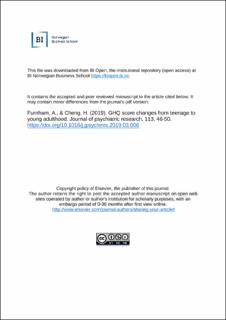| dc.contributor.author | Furnham, Adrian | |
| dc.contributor.author | Cheng, Helen | |
| dc.date.accessioned | 2021-01-21T09:44:32Z | |
| dc.date.available | 2021-01-21T09:44:32Z | |
| dc.date.created | 2019-06-04T14:03:23Z | |
| dc.date.issued | 2019 | |
| dc.identifier.citation | Journal of Psychiatric Research. 2019, 113 46-50. | en_US |
| dc.identifier.issn | 0022-3956 | |
| dc.identifier.uri | https://hdl.handle.net/11250/2724061 | |
| dc.description.abstract | This study investigated the change in the General Health Questionnaire (GHQ-12) scores from teenage years to young adulthood using a large, nationally representative sample in the UK. It took account of socio-demographic variables, childhood intelligence, behavioural problems and self-esteem at teenage and educational qualifications in early adulthood. In total, 3942 cohort members had the complete data on GHQ at ages 16 and 30 years. T-tests showed that there was statistically significant increase of GHQ mean scores over the 14 years (p < .001), however at the item level there were changes in both directions. The analysis showed that over 14 years the test-retest correlation was r = 0.24, indicating a modest level of stability. The GHQ was significantly and negatively associated with self-esteem, and positively associated with childhood behavioural problems. Regression analysis showed that gender, self-esteem, and behavioural problems measured in the teenage years were all significant predictors of GHQ at both time points, indicating the long-term effects of psychological and behavioural factors on teenagers and young adults’ mental health outcome. The implications for early interventions in school and family settings are discussed. | en_US |
| dc.language.iso | eng | en_US |
| dc.publisher | Elsevier | en_US |
| dc.rights | Attribution-NonCommercial-NoDerivatives 4.0 Internasjonal | * |
| dc.rights.uri | http://creativecommons.org/licenses/by-nc-nd/4.0/deed.no | * |
| dc.title | GHQ score changes from teenage to young adulthood | en_US |
| dc.type | Journal article | en_US |
| dc.type | Peer reviewed | en_US |
| dc.description.version | acceptedVersion | en_US |
| dc.source.pagenumber | 46-50 | en_US |
| dc.source.volume | 113 | en_US |
| dc.source.journal | Journal of Psychiatric Research | en_US |
| dc.identifier.doi | 10.1016/j.jpsychires.2019.03.006 | |
| dc.identifier.cristin | 1702653 | |
| cristin.unitcode | 158,4,0,0 | |
| cristin.unitname | Institutt for ledelse og organisasjon | |
| cristin.ispublished | true | |
| cristin.fulltext | postprint | |
| cristin.qualitycode | 1 | |

